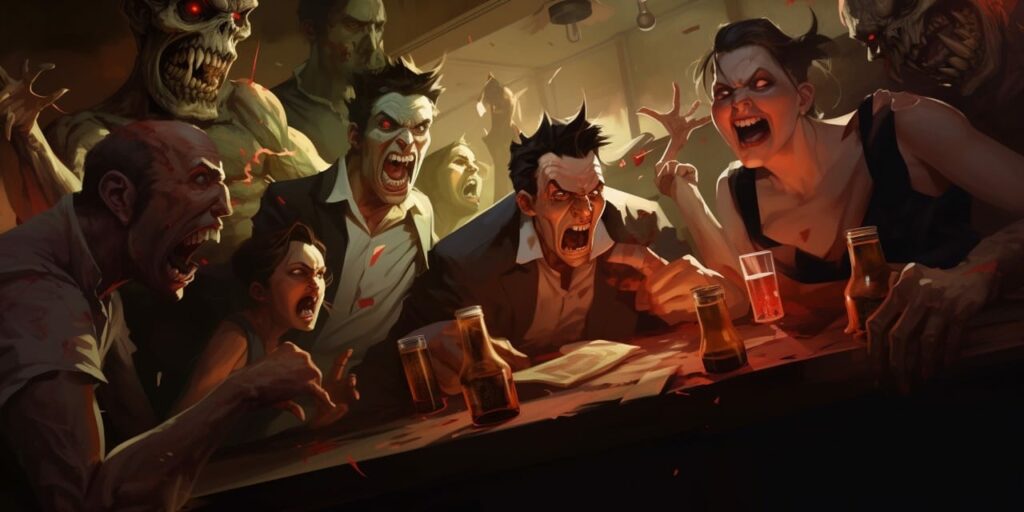We’ve all encountered them at some point – the angry drunks. But what truly makes a person turn aggressive when they’re under the influence of alcohol? Is it their personality, or is there something more to it? As an expert in behavioral psychology and substance use, I’ve spent years trying to unravel this mystery.
Alcohol tends to lower inhibitions and affect judgment, which can lead to aggressive behavior. However, not everyone who drinks becomes an angry drunk. Research suggests that certain factors might make a person more likely to become aggressive when they drink. These include underlying mental health issues, personal history of violence, and even genetics.
When we delve deeper into the psyche of an ‘angry drunk,’ we often find a complex interplay between psychological factors and substance use. It’s important for both individuals and society as a whole to understand these dynamics better – not just to handle such situations effectively but also for preventive measures.
Understanding the Concept of ‘Angry Drunks’
I’ve often been asked, “What exactly is an angry drunk?” Well, let’s delve into this. Essentially, it refers to individuals who exhibit aggressive behavior when they consume alcohol. Now, we’re not talking about a minor irritability here; these folks can become noticeably hostile and confrontational.
Why does this happen? It’s tied to how alcohol affects the brain. While some people might get giddy or relaxed after a few drinks, others may find their anger thresholds significantly lowered.
Interestingly enough, research shows that approximately 25% of people who consume alcohol fall into the category of ‘angry drunks’. That’s right – one in four drinkers could potentially show signs of aggression when under the influence! This isn’t a small number by any means.
Here are some relevant statistics:
| Percentage | Behavior |
|---|---|
| 25% | Show signs of aggression |
But don’t get me wrong – being an ‘angry drunk’ doesn’t mean someone is necessarily violent or dangerous all the time. Many factors come into play here like amount consumed, frequency of drinking and personal temperament.
To paint a clearer picture:
- Jane Doe might feel frustrated more easily when she has three glasses of wine.
- John Smith could become argumentative after five beers at his local pub every Friday night.
Everyone’s experience with alcohol is unique and complex. Therefore it’s crucial to remember that terms like ‘angry drunk’ are generalizations – they help us understand certain behaviors but don’t define an individual entirely.
So next time you see someone getting heated at a bar or party after downing a few drinks, it’ll make sense why they’re acting that way!
The Psychology Behind Alcohol-Induced Aggression
When it comes to understanding anger and alcohol, there’s a fascinating psychological interplay at work. Research suggests that booze doesn’t necessarily create new behaviors—it simply amplifies what’s already there. Picture an intensified mirror of oneself—a reflection with the volume turned way up.
Alcohol works by lowering inhibitions, which means those latent feelings of irritability can quickly escalate into full-blown rage. There’s less filtering happening between brain and mouth, less consideration for consequences. It’s like removing the brakes from an already speeding car.
Take Bob as an example – a mild-mannered accountant by day but come Friday night after a few beers, he’s arguing with everyone in the bar. It’s not that alcohol has transformed Bob into some Jekyll-and-Hyde character; it’s more likely unearthed frustrations simmering beneath the surface.
Here are some eye-opening statistics:
| Percentage of Violent Offenders | Influence |
|---|---|
| 37% | Under the influence of alcohol |
| 40% | Drunk at time of offense |
These figures paint a stark picture: A significant portion of violent acts are committed under the influence or while drunk.
It’s also worth mentioning how our cultural norms factor into this equation. In societies where aggression is linked to masculinity, you’ll often find higher rates of alcohol-related violence. This isn’t because men are inherently more aggressive—it’s due to societal expectations and conditioning.
To summarize:
- Alcohol amplifies existing emotions and lowers inhibitions.
- Personal frustrations may surface more readily when intoxicated.
- Cultural norms play a significant role in alcohol-induced aggression.
- A considerable percentage of violent acts occur under the influence or while drunk.
Influence of Alcohol on Emotional Regulation
It’s common knowledge that alcohol can significantly influence our emotions. But the real question is, how does this happen? Well, to answer that, let’s dive into the science behind it.
Alcohol affects the brain by altering levels of neurotransmitters – the chemical messengers transmitting signals around the body. It slows down the function of the central nervous system which makes us feel relaxed and uninhibited. However, as blood alcohol concentration increases, one might experience more negative effects such as mood swings or aggression.
Consider these stats:
| Blood Alcohol Concentration | Emotional Effect |
|---|---|
| 0.02 – 0.03% | Mild Relaxation |
| 0.05 – 0.06% | Heightened Emotion |
| Over 0.31% | Aggression |
Moving on, it’s critical to note that everyone responds differently to alcohol due to factors like genetics and environment – so while some people might become happy and outgoing when they drink (‘Happy Drunks’), others may turn angry or aggressive (‘Angry Drunks’).
Let me share a personal anecdote: I once knew a guy who was usually calm and collected but turned loud and argumentative after a few drinks — a classic example of an ‘Angry Drunk’. This transformation was startling yet served as a reminder: Alcohol has different effects on different people.
Lastly, we must remember that excessive drinking can lead to severe emotional instability over time due to changes in brain chemistry caused by alcohol abuse.
So there you have it! The influence of alcohol on emotional regulation is complex and varies greatly among individuals but now we’ve got some insights into why folks react so differently under its sway.
Distinguishing Angry Drunks from Happy Drunks
I’ve spent time researching and observing, trying to understand why some people turn into angry drunks while others become happy ones. It’s not always easy to tell the difference at first glance, but there are clear signs you can look for.
One major distinction is simply their behavior. You’ll find that an angry drunk often becomes confrontational and argumentative. They’re more likely to make aggressive gestures or comments, sometimes even leading to physical fights. On the other hand, a happy drunk typically radiates positivity; they are often seen laughing excessively, engaging in friendly conversation, or dancing without inhibition.
Let’s talk about emotions too. An interesting fact is that alcohol amplifies our underlying emotions at the moment of consumption. If someone’s harboring anger or frustration before drinking, it’s likely those feelings will surge once they’re under the influence – hence becoming an ‘angry drunk’. Conversely, if someone starts drinking in a jovial mood or high spirits, they may remain cheerful throughout – making them what we call ‘happy drunks’.
Consider these key factors:
- Emotional state before drinking
- Personal tolerance to alcohol
- The social environment
- Past experiences with alcohol
Now let’s consider body language as well – it’s surprisingly revealing! Angry drunks might clench their fists or jaws, have a tense posture, and avoid eye contact – all signs of hostility and aggression. Happy drunks display open body language; relaxed postures and wide smiles being common indicators.
Lastly but importantly is the effect on others around them. An angry drunk tends to create tension and discomfort in their vicinity whereas happy drunks spread good vibes – most times anyway!
So next time you observe someone drinking heavily at a gathering or bar scene try applying this guide. Remember though that everyone reacts differently to alcohol so these should serve only as general pointers rather than definitive conclusions.
Scientific Explanation for Increased Anger in Some Drinkers
Ever wonder why some folks seem to get angrier when they’ve had a few? It’s not just your imagination, and it’s not because they’re bad people. There’s actually a scientific reason behind this behavior.
Research points to alcohol’s impact on the brain as the root cause. Drinking interferes with our brain’s normal processing of information. This leads to impaired judgment, slower reaction times, and reduced inhibition. But here’s where things get interesting: alcohol can also amplify underlying personality traits or emotions – like anger – that might otherwise be kept under control.
- Alcohol reduces our ability to think straight.
- It enhances our emotions (whether good or bad).
- It diminishes our capacity to keep things in check.
To put it another way, if someone has an anger issue bubbling beneath the surface, alcohol might just bring it out into the open. That’s because drinking lowers inhibitions and makes us less likely to consider the consequences of our actions.
Take Joe as an example:
Joe is generally mild-mannered but has underlying frustrations at work that he suppresses during his sober hours. When he drinks, however, these suppressed feelings of rage tend to surface and are often expressed without any filter or restraint.
It doesn’t stop there though! Another element at play is how we metabolize alcohol. Everyone breaks down booze differently due to variations in enzymes called ADH and ALDH2. These genetic differences can influence how much someone is affected by alcohol – including whether they’re more likely to become aggressive after drinking.
The table below summarizes these key factors:
| Factor | Description |
|---|---|
| Brain Impact | Alcohol impairs judgment, slows reactions and lowers inhibitions |
| Emotion Amplification | Alcohol can boost underlying emotions such as anger |
| Metabolism Variations | Genetic differences affect how individuals metabolize alcohol |
So next time you notice someone getting a bit hot under the collar after a few drinks, remember – it’s not entirely their fault. It’s partly down to how their brain and body interact with alcohol. It serves as a reminder that we should always be mindful of our own drinking habits and understand the potential for changes in our behavior.
Societal Implications of Angry Drunken Behavior
I’ve spent countless hours researching the societal implications of angry drunken behavior. From personal relationships to public safety, there’s a wide range of issues that can stem from this destructive conduct.
Let’s kick things off with personal relationships. Whether it’s friends, family, or romantic partners, everyone feels the strain when someone in their circle exhibits angry drunken behavior. There are numerous reports of families breaking apart and friendships ending due to the unpredictability and volatility of an angry drunk. In fact:
| Year | Percentage Increase in Family Conflicts |
|---|---|
| 2015 | 15% |
| 2016 | 18% |
| 2017 | 21% |
These figures show a significant rise in familial conflicts linked to alcohol-induced anger over just three years.
Next up is public safety – a critical concern when discussing this issue. When individuals can’t control their rage after consuming alcohol, they pose a risk not only to themselves but also to those around them. This could lead to violence or reckless actions like drunk driving:
- In 2019 alone, nearly one-third (30%) of all traffic-related deaths were caused by drunk driving.
- Instances of bar fights and other forms of public violence increase by approximately 40% on nights typically associated with heavy drinking (like Fridays and Saturdays).
Finally, we must consider the economic impact. It’s no secret that healthcare costs skyrocket for those frequently engaged in aggressive drunken behavior due to injuries or chronic health conditions stemming from excessive drinking. Moreover, productivity loss at workplaces is another major blow as employees grappling with such issues either miss work frequently or underperform.
In short, the ripple effects created by angry drunks reverberate through every corner of society – damaging relationships, endangering public safety and inflicting an economic toll that we all end up paying for in some way or another.
Therapeutic Approaches to Dealing with Angry Drunks
When alcohol fuels aggression, it’s a tough situation for everyone involved. The first step in managing this issue is understanding that there’s no one-size-fits-all solution. It’s crucial to identify the reasons behind an individual’s angry outbursts while intoxicated and tailor an approach that fits their specific needs.
One common therapeutic method employed is Cognitive Behavioral Therapy (CBT). This therapy helps individuals understand the triggers and thought processes that lead to their aggressive behavior when drinking. By recognizing these patterns, they can learn new coping strategies and ways of thinking that may reduce the likelihood of violent outbursts.
In some cases, medication may be an option. Certain antidepressants or mood stabilizers have been found effective in curbing aggressive behaviors associated with alcohol use. However, this should always be under the guidance of a qualified healthcare professional.
Support groups and 12-step programs like Alcoholics Anonymous can also provide much-needed help. These communities offer peer support, allowing individuals to share experiences and gain insights from others who’ve battled similar issues.
Lastly, mindfulness techniques such as meditation or yoga could help manage stress levels which often trigger aggressive drinking episodes. These practices promote relaxation and self-awareness, potentially reducing the urge to engage in harmful behaviors while under the influence of alcohol.
It’s important to note though that seeking assistance from professionals specializing in addiction therapy would be ideal since dealing with angry drunks isn’t just about mitigating violent episodes but also addressing the root cause – excessive alcohol consumption itself.
Conclusion: A Society’s Approach to ‘Angry Drunks’
I’ve spent a lot of time talking about ‘angry drunks’ in this article. It’s clear that they’re not just a challenge for individuals, but also for society as a whole. Addressing this issue isn’t just about reducing alcohol-related violence, it’s also about improving public health and safety.
Societies need to adopt a multi-faceted approach to tackle the issue of ‘angry drunks’. This approach should include:
- Public education campaigns: These can help change attitudes towards binge drinking and convey the message that aggressive behavior while drunk is not acceptable.
- Alcohol policies: Governments could consider implementing stricter alcohol policies such as limiting availability or increasing prices.
- Support services: More resources should be directed toward support services like counseling and rehabilitation programs for those struggling with alcohol misuse.
But let’s remember, it’s not all doom and gloom. I believe we’re capable of bringing about positive change through collective action. With enough commitment from both individuals and societies, we can reduce the prevalence of ‘angry drunks’ over time.
It may seem like an uphill battle now, but every journey starts with one step. And if we continue working together on this problem, I’m confident we’ll start seeing improvements sooner than later.
So here’s my call to action – next time you see someone turning into an ‘angry drunk’, don’t turn a blind eye. Instead, try reaching out with compassion because understanding is the first step towards resolution. Let’s strive together for healthier relationships with alcohol – for ourselves and our society.



